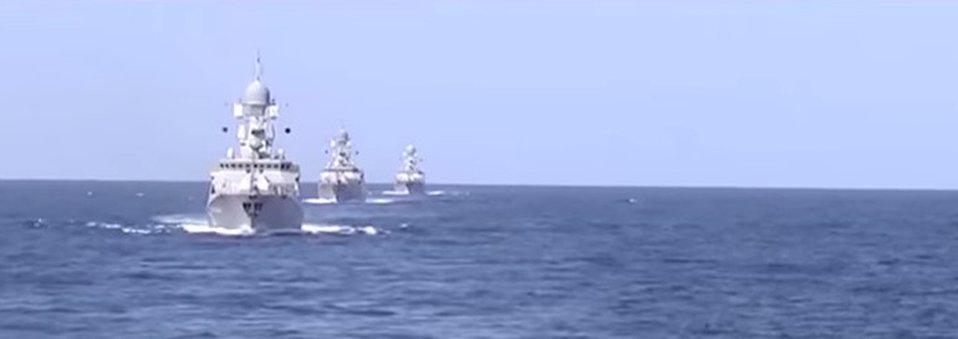Russian missiles 'hit IS in Syria from Caspian Sea'
- Published
The Russian defence ministry released video it said shows missiles being launched
Russia says it has launched rocket strikes on Islamic State group targets in Syria from warships in the Caspian Sea - about 1,500km (930 miles) away.
Defence Minister Sergei Shoigu said four warships fired 26 sea-based cruise missiles at 11 targets, destroying them and causing no civilian casualties.
Meanwhile, Syrian ground troops have launched an offensive under Russian air cover, Syrian officials say.
Russia denies claims that its week of strikes have mainly hit non-IS targets.
The Syrian Observatory for Human Rights reported "the most intense fighting in months" in Hama and Idlib provinces. The clashes followed a wave of Russian air strikes in the same areas, it said.
BBC's Quentin Sommerville: "Syria's new ground war has only just begun"
It appears to be the first co-ordinated offensive since the air campaign by Russia - a staunch ally of Syrian President Bashar al-Assad - began on 30 September.
Russia says it is targeting "all terrorists", but at least some of its air strikes have reportedly hit civilians and Western-backed rebels.
In a separate development, Russia's foreign ministry has said Moscow is willing to establish contact with a Western-backed rebel group, the Free Syrian Army, to discuss fighting IS "and other terrorist groups", and "preparing the ground for a political settlement in Syria".
US Defence Secretary Ash Carter said that coalition forces fighting IS in Syria would not co-operate with Russia.
"We believe Russia has the wrong strategy," he said. "They continue to hit targets that are not IS. We believe this is a fundamental mistake."
Pentagon officials later revealed they had had to carry out at least one "safe separation" manoeuvre to avoid a US jet coming too close to a Russian aircraft over Syria. They said this happened after 1 October, without giving a specific date.


New twist: By BBC defence correspondent Jonathan Marcus
Russia's decision to attack what it claims to be IS targets in Syria with cruise missiles fired from warships in the Caspian Sea represents a new twist to Moscow's growing involvement in the crisis.
It is not clear yet why these particular weapons were chosen in preference to air strikes - but the missiles would have had to fly a considerable distance over Iran and then Iraq to reach Syria.
Sea-launched cruise missiles have long been a weapon of choice in US interventions overseas, so there may be an element of Russia demonstrating that it has the full military panoply of any other "superpower".
But it adds yet a further complication to the air campaign in the skies over Syria. Of more significance may be early signs of Syrian government counter-offensives - aided by their allies - which could be linked to the Russian air campaign.
More from Jonathan Marcus:
High-stakes gamble - Russia's two Turkish incursions highlight the risk of a potential clash
What can Russia's military achieve? Why should Russia do any better than the US-led coalition?

Turkish warning
During a televised meeting with Russian President Vladimir Putin, Mr Shoigu said the cruise missiles had destroyed all targets - including command-and-control centres and ammunition depots - and that there had been no damage to civilian installations.
The Kalibr-Nk terrain-following missiles were fired overnight from the south-western Caspian, and approached their targets at the altitude of up to 50m (160ft) over an "uninhabited area", the defence ministry said.
The Russian defence ministry's Twitter feed, external showed footage of cruise missiles being launched, saying they "successfully hit all assigned #ISIS [IS] targets with high accuracy".
A media outlet linked to IS published images of what it said were the remains of a Scud missile bearing Russian writing that hit the outskirts of the city of Tabqa - about 55km west of the IS-held northern city of Raqqa on Wednesday morning.
During the meeting with President Putin, Mr Shoigu said 112 targets had been hit since the Russian bombing began.



Russia's Caspian fleet
The Caspian Flotilla - together with the Black Sea Fleet - is a maritime part of Russia's Southern Military District, stationed in the port city of Astrakhan. According to the Russian defence ministry, external, the flotilla consists of several brigades and divisions of surface ships and coastal troop units
The Russian navy announced in 2011 that the Caspian Flotilla would receive 16 new warships and missile-carrying vessels by 2020, external. Two missile-carrying boats were sent there in the same year
In 2014, the Caspian states signed a treaty banning any military deployment by a non-Caspian state, external there, ruling out any possible deployment of Nato forces there
The Caspian Sea is the largest completely enclosed body of salt water in the world. But there is disagreement among surrounding states, external over whether it is a sea or a lake, which would have legal consequences for territorial waters and the exploitation of natural resources
